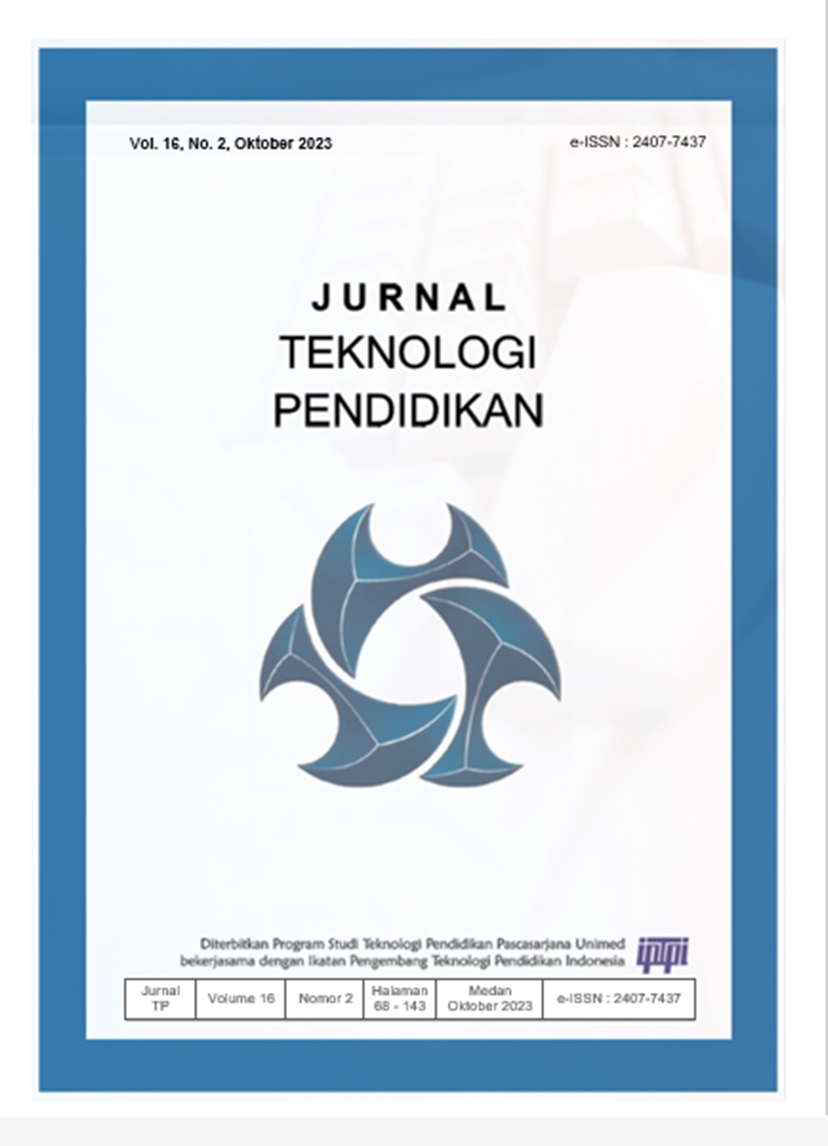PENINGKATAN HASIL BELAJAR SISTEM KOMPUTER MELALUI PENERAPAN PEMBELAJARAN BERBASIS KOMPUTER
DOI:
https://doi.org/10.24114/jtp.v16i2.47834Keywords:
Sistem komputer, pendekatan berbasis komputer, hasil belajar, gerbang logika dasarAbstract
Abstrak: Penelitian ini bertujuan untuk mengetahui peningkatan hasil belajar sistem komputer melalui penerapan pendekatan belajar berbasis komputer. Jenis penelitian ini adalah penelitian tindakan kelas (PTK) dengan dua siklus. Penelitian Tindakan Kelas merupakan penelitian dengan melakukan tindakan oleh guru di dalam kelasnya sendiri. Kegiatan tersebut dilakukan melalui refleksi diri dengan tujuan memperbaiki kinerja sebagai guru. Subjek dalam penelitian ini adalah adalah siswa kelas X TKJ 1 SMKN 1 Muara Kuang dengan jumlah 29 orang. Hasil penelitian menunjukkan bahwa proses pembelajaran sistem komputer dengan penerapan pembelajaran berbasis komputer dapat meningkatkan hasil belajar siswa pada materi Gerbang logika dasar, kombinasi dan sekuensial di kelas X.TKJ1 SMKN 1 Muara Kuang tahun pelajaran 2019/2020. Rata-rata hasil belajar siswa pada mata pelajaran sistem komputer pada siklus I adalah 75 dan pada siklus II adalah 80.Kata Kunci: Sistem komputer, pendekatan berbasis komputer, hasil belajar, gerbang logika dasar.Abstract: This study aims to determine the increase in learning outcomes of computer systems through the application of a computer-based learning approach. This type of research is classroom action research (CAR) with two cycles. Classroom Action Research is research by taking action by the teacher in his own class. This activity is carried out through self-reflection with the aim of improving performance as a teacher. The subjects in this study were students of class X TKJ 1 SMKN 1 Muara Kuang with a total of 29 people. The results of the study show that the learning process of computer systems with the application of computer-based learning can improve student learning outcomes in basic, combinational and sequential logic gate material in class X.TKJ1 SMKN 1 Muara Kuang in the 2019/2020 academic year. The average student learning outcomes in computer systems subjects in cycle I was 75 and in cycle II was 80.Keywords: Computer systems, computer-based approaches, learning outcomes, basic logic gates.References
Amin, M., & Mustaqim, B. (2021a). Vocational Teachers Readiness In Integration The Principles Of Industrial Revolution 4.0. Into The Learning Process. Elinvo (Electronics, Informatics, and Vocational Education), 6(2), 106“119.
Amin, M., & Mustaqim, B. (2021b). Vocational Teachers Readiness in Integration The Principles of Industrial Revolution 4 . 0 into The Learning Process. 6(November), 106“119. https://doi.org/doi.org/10.21831/elinvo.v6i1.44210 Vocational
Blinova, T., Bylina, S., & Rusanovskiy, V. (2015). Vocational Education in the System of Determinants of Reducing Youth Unemployment: Interregional Comparisons. Procedia - Social and Behavioral Sciences, 214(June), 526“534. https://doi.org/10.1016/j.sbspro.2015.11.756
Gruzdeva, M. L., Vaganova, O. I., Kaznacheeva, S. N., Bystrova, N. V, & Chanchina, A. V. (2020). Modern educational technologies in professional education. Growth Poles of the Global Economy: Emergence, Changes and Future Perspectives, 1097“1103.
Mulyadi, Y. (2019a). Vocational Teacher Perception on Industry 4.0 and Society 5.0. Global Conferences Series: Sciences and Technology (GCSST), Volume 2, 2019 The 1st International Conference on Education, Sciences and Technology, 2, 62“68.
Mulyadi, Y. (2019b). Vocational Teacher Perception on Industry 4.0 and Society 5.0. Global Conferences Series: Sciences and Technology (GCSST), Volume 2, 2019 The 1st International Conference on Education, Sciences and Technology, 2, 62“68. https://doi.org/doi.org/10.32698//tech1315126
Novita, R., & Harahap, S. Z. (2020). Pengembangan media pembelajaran interaktif pada mata pelajaran sistem komputer di SMK. Informatika, 8(1), 36“44.
Plummer, L., Smith, L., Cornforth, E., & Gore, S. (2021). Teaching psychomotor skills in a virtual environment: An educational case study. Education Sciences, 11(9), 537.
Rahayu, M., Hariyanto, T., & Fadhlan, M. Y. (2020). IoT Trainer Kit Training For Vocational School Teachers As Preparation Towards The 4.0 Industry Era. REKA ELKOMIKA: Jurnal Pengabdian Kepada Masyarakat, 1(2), 98“110. https://doi.org/10.26760/rekaelkomika.v1i2.98-110
Sari, N., Dewi Kartini Ompusunggu, V., & Daliani, M. (2020). Analisis Penggunaan Media Google Classroom terhadap Proses Belajar Mengajar pada Mahasiswa PGSD Universitas Quality Selama Masa Bencana Pandemi Covid-19. Journal of Education and Teaching (JET), 1(1), 1“8. https://doi.org/10.51454/jet.v1i1.6
Sasmoko, Noerlina, Indrianti, Y., & Wahid, N. H. A. (2020). Indonesian vocational engagement (I-vocatie): A new concept in improving teacher competencies 4.0. Journal of Technical Education and Training, 12(3 Special Issue), 97“105. https://doi.org/10.30880/jtet.2020.12.03.010
Sibuea, A. M., Amin, M., & Mustaqim, B. (2021). Metodologi Penelitian Pendidikan: Pendidikan Teknik Elektro. Lembaga Penelitian dan Pengabdian Kepada Masyarakat (LPPM) UNIMED.
Wardani, M. A. P., & Harwanto, H. (2020). Pengaruh Penerapan Strategi Pembelajaran Berbasis ICT Terhadap Pencapaian Hasil Belajar Sistem Komputer Siswa Kelas X SMK. Faktor: Jurnal Ilmiah Kependidikan, 7(2), 99“106.
Yunos, J., Chee, L., Ph, S., Tze, T., Ph, K., & Ed, H. H. M. (2016). The Issues and Chalenges of Vocational Teacher Education Program. Annual International Seminar on Transformative Education and Educational Leadership, 2025, 7“14. https://doi.org/2548-4613
Downloads
Published
How to Cite
Issue
Section
License
Copyright (c) 2023 Jurnal Teknologi Pendidikan (JTP)

This work is licensed under a Creative Commons Attribution 4.0 International License.

Jurnal Teknologi Pendidikan (JTP) is licensed under a Lisensi Creative Commons Atribusi 4.0 Internasional.




